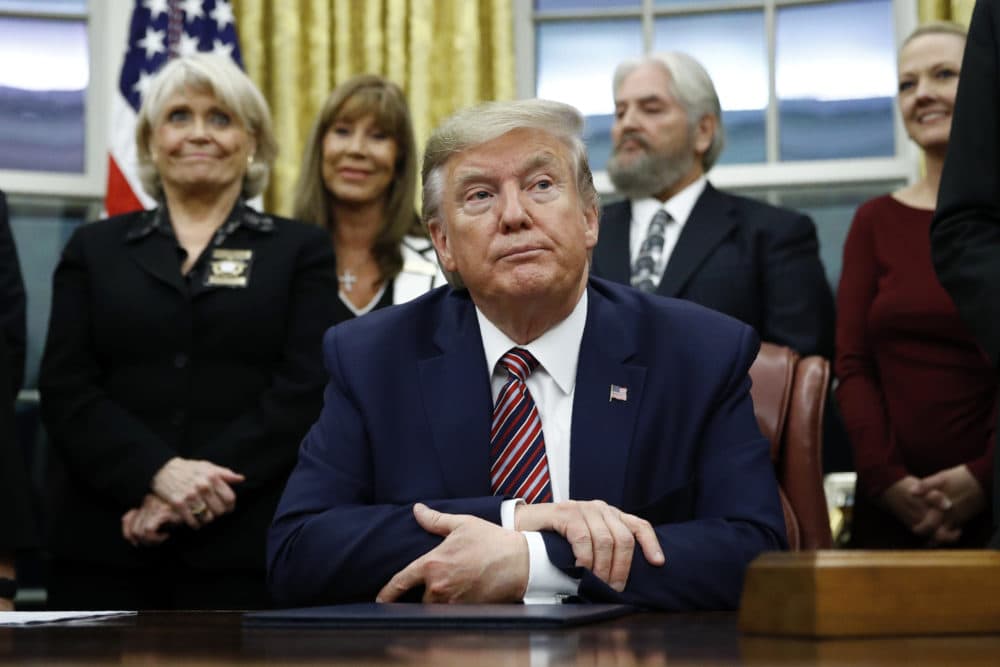Advertisement
FAQ About Trump's Impeachment, Answered
Resume
Even if you spend hours watching the Senate impeachment trial of President Trump, it can be difficult to make sense of what’s going on.
But never fear — NPR’s Ron Elving is here to answer Here & Now listeners’ questions about the process and potential outcome.
Have more questions about impeachment? Ask us here.
Your Impeachment Questions, Answered By Ron Elving
Why are senators not being admonished for leaving the room, reading books, talking to each other and giving interviews when they are supposed to be listening to the prosecutors? — Keran Johnson
That’s up to the presiding officer — Chief Justice John Roberts.
“The simple answer is because Chief Justice John Roberts doesn't feel like playing the role of, if you will, schoolmarm and telling them all to get back to their seats. The discipline must be imposed by the presiding officer. There's really no one else to do it, and he does not seem to be inclined to do it. The behavior has actually gotten better because people have gotten more interested in sitting down and listening to what was being said. But there has been a lot of breach of the rules that you describe.”
Can Justice Roberts compel the White House to comply with subpoenas for documents and/or witnesses? — Cori Thurlow of Massachusetts
No, not on his own.
“That would involve the court, not just John Roberts. He could not, as the presiding officer in this trial, simply declare that the subpoenas that might have been issued earlier by the House or any subpoenas that might be issued now had to be honored by the president. Generally speaking, it would not begin at the Supreme Court level. It would begin at a district court level, then go to an appeals court, [which] would take weeks, months before that was ruled on. It's not inconceivable that the court could move faster. But we have seen very little inclination on the part of this court to move at the speed of impeachment.”
If President Trump is removed from office, would the acting president — Mike Pence — automatically be entered as the Republican presidential candidate? If not, is there enough time for another Republican candidate to campaign before the election? — Danielle Herrera of Boston, Massachusetts
No, not necessarily.
“Mike Pence, I think, would be automatically interested in being the nominee, but that does not make him the nominee. And there would have to be a process. And if Mike Pence wanted to be president, there would probably be some other Senate Republicans, gubernatorial Republicans who would want to run as well.”
Trump has implied that his tweets are legal and binding by his response required of the Wars Power Act via Twitter. Can Congress use his tweets as legal and binding as part of the impeachment since he considers them legal and binding? — Aaron of Rancho Cucamonga, California
Yes.
“[Trump’s tweets] have been declared, in essence, to be official White House statements. So if he says or does something with his Twitter account that would seem to be obstructing Congress or ultimately, in perhaps another proceeding, obstructing justice — which he is not accused of in this impeachment trial. And that doesn't happen to be a piece of evidence that the Democrats are using particularly in this particular proceeding.”
If there were enough votes to remove Trump from office, how does that procedure work? How long would it take and what would happen if he refused to leave? — Bobbie Lynn Hutchins of Bar Harbor, Maine
There’s no precedent for that.
“We're in somewhat uncharted waters here because no president has ever been compelled to leave. And in the cases of the two other impeachment processes that we've seen, [Richard] Nixon voluntarily resigned before he was impeached and removed. In the case back in the 1860s and again with Bill Clinton, the Senate chose not to remove the president. We don't really have any guidelines here. One assumes that the judgment of the Senate would be enforced by the Supreme Court. And at that point, the president would no longer have the authority to be president or call himself president. Someone else would. Mike Pence would and legal authorities would follow his word rather than Donald Trump's.”
What is the likelihood, based on the makeup of the Senate, of removing Trump from office? — Chelsea from Massachusetts
It’s unlikely the Senate will vote to remove Trump.
“It's simply not likely. We are debating at this moment whether there would be a handful of Republicans — four at minimum, maybe a half a dozen — who would be willing to vote for a rule allowing for witnesses. And so that's a question mark, whether there would be four if the Senate Republicans were going to vote to remove the president, there would need to be 20 of them. And at this point, there's no indication that we're anywhere near that number or even, for that matter, single digits. So it's a long, long step from where we are now to 20 Republicans being willing to vote to remove the president from office.”
Marcelle Hutchins produced and edited this interview for broadcast with Kathleen McKenna. Allison Hagan adapted it for the web.
This segment aired on January 29, 2020.
